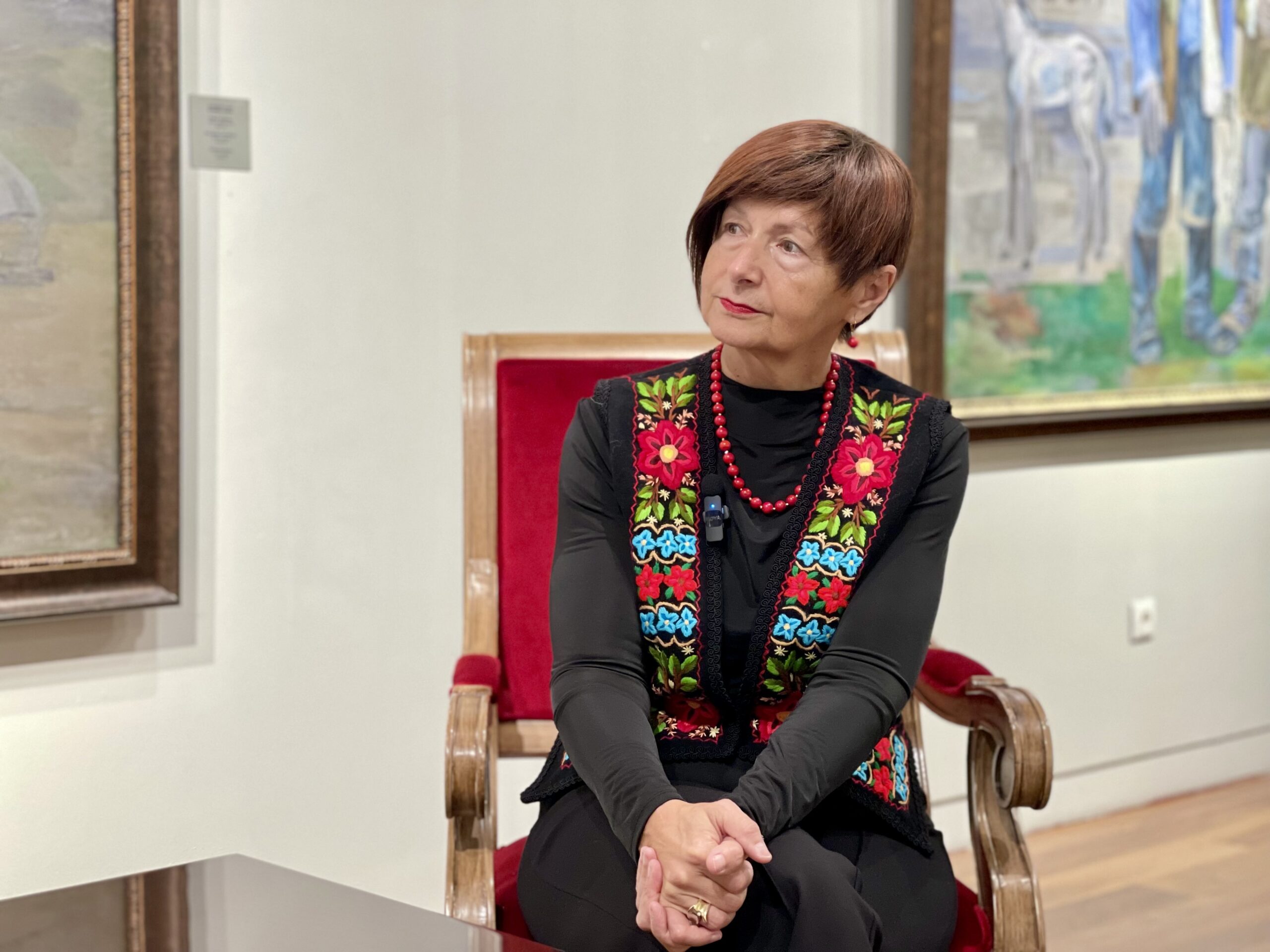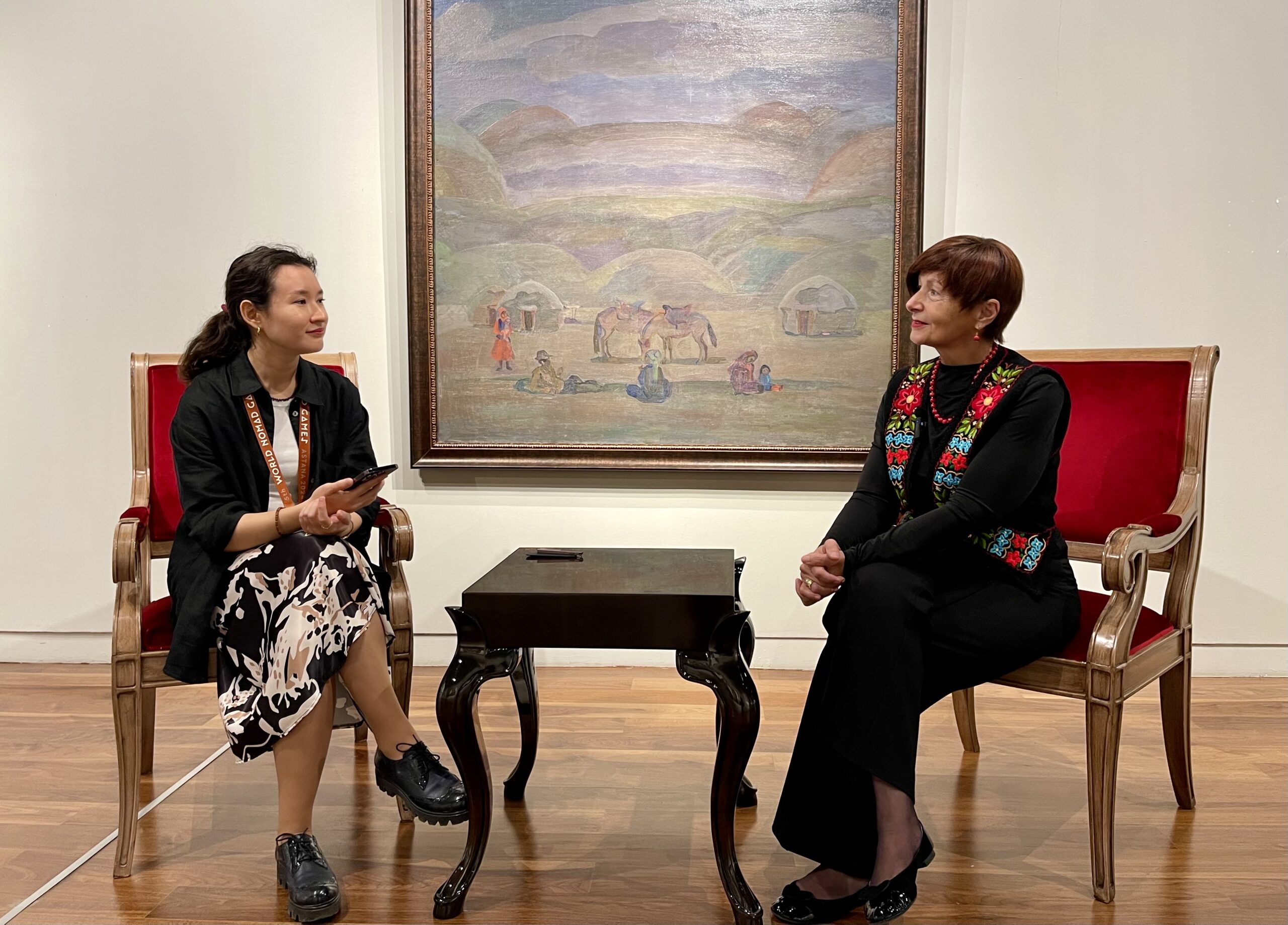ASTANA – The President of the 42nd session of the United Nations Educational, Scientific and Cultural Organization (UNESCO)’s General Conference and Romanian Ambassador, Simona-Mirela Miculescu, has stressed the importance of the World Nomad Games in promoting peace and preserving cultural heritage worldwide in an interview with The Astana Times.

Simona-Mirela Miculescu, President of the General Conference of UNESCO. Photo credit: Aruzhan Ualikhanova/The Astana Times
Nomad Games – majestic event
Miculescu has attended the opening ceremony of the fifth World Nomad Games, which began in Astana on Sept. 8 with a spectacular show celebrating the rich heritage and enduring spirit of nomadic people.
“Congratulations for the way Kazakhstan started – in a majestic way – this competition. At the opening ceremony it was a feast in terms of culture and civilization and inspiration. So it was a wonderful start, which tells a lot about the values of the nomadic civilization, and they were present on the stage plentifully,” said Miculescu.

The Astana Times reporter Aibarshyn Akhmetkali during the interview with Simona-Mirela Miculescu, President of the General Conference of UNESCO. Photo credit: Aruzhan Ualikhanova/The Astana Times
According to her, UNESCO has always supported the World Nomad Games, as they embody values deeply cherished by the organization. Hosting events such as the World Nomad Games is also one way to spread peace and promote cultural heritage around the globe.
“That is why UNESCO has been supporting and will always support the World Nomad Games, because they embody values very dear to UNESCO. Exactly the essence of the mission of UNESCO: building peace in the minds of men and women while preserving and promoting cultural heritage and traditions. So it is a perfect synergy between objectives,” said Miculescu.
“It’s also not by chance that the Director General of UNESCO granted the high patronage to this edition of the games. It’s not by chance that the World Nomad Games became unanimously part of UNESCO’s Intangible Cultural Heritage. So there are a lot of examples telling you how much UNESCO has been supporting this, and I know that the regional office of UNESCO, based in Almaty, is a constant and very reliable partner of the Kazakh authorities. So this beautiful synergy actually is present all the time, and not only in this area but in all the areas that are of UNESCO’s competence: culture, education, heritage, arts, science, communication and information,” Miculescu added.
Heritage might be the best way to foster dialogue among cultures and the growing popularity of the World Nomad Games might be a testament to that.
“I think that the fact that you had this year 89 countries, including countries who don’t have nomadic population – this tells a lot about how these World Nomad Games, and especially the cultural values that they represent, resonate with ever more countries around the globe. When I say globe, I mean I was really impressed to see Barbados, for instance, or you know, countries that you don’t expect to see on the stage and in such a parade of participating countries,” said Miculescu.
“This is also something very important for UNESCO, because UNESCO is a global organization, so the more the merrier. The more members or the more countries join, it is even better because these sound moral values of the nomadic civilization are spreading,” she added.
Priorities under her mandate at UNESCO
The next 43rd UNESCO General Conference is scheduled to take place in Samarkand, Uzbekistan, in 2025. It will be a historic conference, marking the first time a Central Asian country hosts the biennial event, which hasn’t been held outside UNESCO’s Paris headquarters since 1985.
“The decision was adopted during my presidency. So I’m very happy,” said Miculescu.
Speaking of her primary goals at UNESCO, Miculescu said she aims to promote discussion on the importance of intellectual cooperation in the hope that it will reinforce efforts to protect and revitalize the UNESCO archives.
“My main objective is to revive the intellectual cooperation dimension of UNESCO. I want us to struggle against any further politicization of our debates, which is unfortunately ever more present in the conference halls in the international environment in general, including UNESCO. I want to revive this intellectual cooperation dimension and also, in symbiosis with this, to save the archives of UNESCO, which are in a very bad shape,” said Miculescu.
“My main project starts actually this Friday, on the 13th of September. There will be a major conference that I will organize at UNESCO, gathering a lot of interesting people from the academic environments, writers, philosophers, where we will honor what happened 100 years ago when the precursor of UNESCO was set up in Paris in 1924. It was the International Institute on Intellectual Cooperation,” she added.
The continued devastation of the intellectual treasures at UNESCO might deprive future generations of a resource of immense historical value, making it crucial to bring this issue to the forefront.
“We celebrate this by reviving what was born 100 years ago. We will talk about those times because actually, Albert Einstein, Marie Curie, Paul Valery, the geniuses of those times, were involved in the work of this institute. We will present the archives of UNESCO and what is to be saved, because it is the memory of the world there. And I will also seek for the support of your country in this respect,” said Miculescu.
Protecting intellectual heritage requires continued collaboration between states and authorities, according to her.
“I hope that with this project, I will start a presidential tradition. I think that every President of the General Conference from now on should keep an eye on the state of the archives trying to digitalize, which means not only saving but also giving ever more access to ever more people to the wonders that lie in the underground of UNESCO. And never to forget about the intellectual cooperation that generated the spirit and the mission of UNESCO,” said Miculescu.
